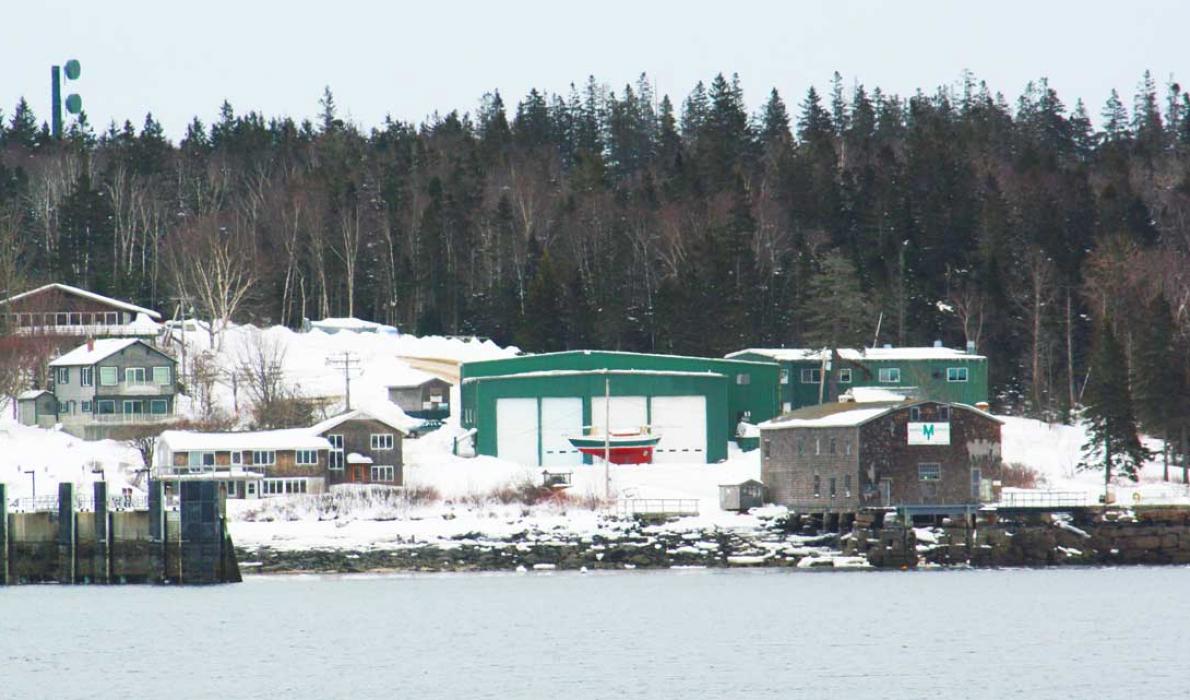Posted March 16, 2015
Last modified March 17, 2015
TREMONT — A waterfront boatyard dating back at least to the 1940s could face transformation and be split into residential and mixed-use maritime uses, with a developer from Southern Maine exploring options.
It could be a return, of sorts, to the original mix of uses on the property, which was once home not only to boat-related activities but, at various times, to cottages, a popular cabaret restaurant and even an icehouse in the misty past.
The Morris Yacht yard is in Bass Harbor, a lovely waterfront on Mount Desert Island, lively year-round with a large fishing fleet and more so in the summer when pleasure and tour boats are in the water. The shore is lined by homes, the Swan's Island ferry terminal, the town wharf and small businesses.
Located at the end of a narrow, S-curved shore road, the yard got its start with a boatbuilder named Grandville "Sim" Davis, who turned an old coal storage building on the shore into a boat shop. The building is still there, remnants of the launching ways still underneath, lofting lines visible on the second-story.
The yard evolved over the years. After Davis, it was owned by Bass Harbor Marine, which expanded the infrastructure and used the original building for spar storage.
Morris, producer of luxury sailboats, bought the yard in 1999, shifting operations from its original home in neighboring Southwest Harbor and creating a portfolio that today also includes yards, all within a 15-mile radius of each other, in Northeast Harbor and Trenton, which handle new construction, brokerage and service, along with a second sales office in Newport, R.I.
In 2013, Morris decided to sell the Bass Harbor yard, a move designed to integrate operations and achieve better efficiencies, according to company information.
Recently, a potential buyer emerged.
"We think the Morris property has a ton of upsides. It's worth taking a look at," said Southern Maine developer Paul Hollis, who has developed several mostly residential projects on waterfront properties in York. "It's been historically working waterfront, and we can't go there and change that too much. These small towns are built on those waterfronts. Those waterfronts generate a lot of money for small towns, and in this case, you’ve got to think outside the box a little. We just want to find out what we can do and see how it all fits within the current zoning."
Hollis said he became aware of the 5.2-acre property, listed at $2.88 million, through the broker, from whose company he's bought property in the past. Now he's exploring options for the property. Ideas so far include construction of residential condominium homes to the rear, which is zoned for residences and businesses, and marina-related uses that fit within the zoning in the front half, by the water. Redevelopment by the water is limited by its zoning designation, which requires commercial fishing or other maritime and water-dependent activities. Here, Hollis proposed mixed-use development, including an area of protected space, a business condominium and dockage for property owners.
The yard's transformation would not be surprising. Builders and storage firms today don't need shorefront to build and launch boats; they can truck boats inland, where property is less expensive. In 2001, Bass Harbor saw a defunct sardine cannery transformed into a residential condominium.
Hollis is in preliminary discussions with town and state planners to figure out what's allowed on the property. Conceptually, he said, questions center on blending the uses of the two zones "for the benefit of the people who are going to be there, who live there and work there and, at the same time, stay within the zoning the town has laid out." He plans to reach out to the community regarding the historical importance, if any, of the Sim Davis building.
Above all, he said, it's important to him to conform with townspeople's wishes.
"If it's not a win-win for the town of Tremont, we're not interested in pursuing it," he said. "I'm an outsider up there. Those people are hard-working, humble people. It's a process of determining a use they would embrace and that we would be committed to."
Contributed by

